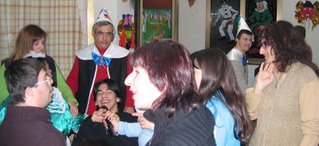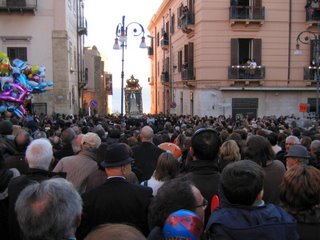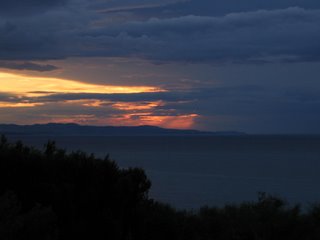Well, I think it has been a fairly strange news week, so I have decided to write a short piece on the top stories, as I see them. Of course there are stories about soccer, indeed, soccer in Sicily, and I think it got some coverage in the US. There are also stories about gasoline, the mafia, and the upcoming Carnevale celebration in Sciacca.
First, the soccer. After the big match between cross island rivals between Palermo and Catania, played in Catania, there was a big riot. The sort of thing one might expect after a city in the US wins the World Series, the NCAA Football or Basketball title, the NBA championship, or some other hometown makes good event. Indeed, in Catania, the rioting started during the second half, outside the stadium, and the game had to be suspended for a little while as the players adjusted to the tear gas that drifted onto the playing field. After the game was over, the rioting started in earnest, and over 1,000 polizioti battled the disgruntled Catania fans. The police used tear gas, their truncheons, their orchestrated charges into the riot area beating their shields with their truncheons. The drove their police cars through the crowds to get them to break up.
The rioters, ragazzi one and all, used stones, bricks, emergency flairs, and some homemade bombs that they just happened to have on them, to fight back. One such bomb went through a police car window, exploded, and killed a police officer. Things were very bad there. In the last 25 years, about 20 people have died due to soccer violence of this sort, but this was the first time a police officer died. That made a big difference.
All soccer games in Italy were cancelled. This makes it comprable to the cancelling of all sporting events after 9/11 in the US. The soccer federation, the players union, the owners, and the government had had enough, indeed, more than enough. Even Burlesconi agreed with Prodi's government about the cancellation of the games, although he was quick to say that missed games must be made up in the future. After all, the team he owns was scheduled to have a home game that was cancelled and he would lose revenue, and his friend Rupert Murdoch, who owns broadcast rights to all Series A games, was going to take a financial bath due to the cancelled games.
The game was an important one, as Palermo is in fourth place in Series A (the big leagues of Italian Soccer), and Catania, in its first year in Series A, was in fifth place. The top four teams get to compete in the all Europe Champions League the following year, as well as Series A, and that is very important, professionally as well as financially. So it was a big game.
As it turns out, Palermo did win the game, two goals to one. It was difficult to find this out, as the score was not reported in the first three pages of stories about the game and its aftermath in the sports section.
Usually, on Sundays, when most of the games are played, while Sky Satellite broadcasts all of the games, two of the national and many local TV stations broadcast commentary on the games in front of a live audience in a studio. Fans for the various teams cheer when it is announced that their side has scored a goal, and one station actually has a group of soccer players re-enact each goal that is scored from an otherwise unused soccer pitch.
I would have thought that the studio stadio broadcasts would be cancelled along with the games, replaced by third run Sunday afternoon, there is nothing better to do than watch, old movies. But no, the programs carried on, with the usual mix of fans, and instead of announcing goals, various players, owners, referees, and government officials were interviewed live in the studio or on telephone hook ups. As each weighed in and said that the hooliganism had to stop, each was in turn cheered by the audience, who also took turns saying it was terrible that someone died, and something had to be done.
Such unanimity is indeed unusual in Italy.
But enough about soccer, let us talk about gasoline. You of course know that Italians pay about twice what Americans pay for gas, indeed I have enjoyed telling gas station clerks that I like the low prices when I get the tank filled when I am visiting in the US. They think I am kidding.
Right now, the government is trying to liberalize the regulations of who can sell gas, and at what price. The gas station owners are against this, as they have, through their trade association, an informal monoploy. The benzineolli (pump jockeys) are also against this, as if shopping centers are allowed to start selling gas, they may be non union workers and may take jobs away from their heretofore strong union. So all of the gas stations in Italy are closed for two days, and in Sicily, for some reason, for three days. There is a gas station open in Sciacca, that is available to police cars, ambulances, post office vehicles, and a few busses and commercial carriers. It is monitored by the police, to make sure citizens to not get gasoline during the strike.
The night before the strike, the lines of folks at gas stations reminded me of the lines at gas stations in the US when there was an announced shortage. And everyone was getting a full tank, although usually in Sicily people buy no more than ten or twenty euros of gas at a time (about 8 or 16 liters, or two to four gallons). Yes, even I filled my tank. After working through the lines, the benzineolli will need a few days off.
The national anti mafia commission, with a new head, has made a startling discover. The mafia has infiltrated a new group of organizations, and is using their infiltration to extract money from the government that would otherwise be spent for the common good. The group of organizations are the regional, provincial, and local organizations that get government funding to fight the mafia. Now I do not claim to be super hip, but everyone I knew was aware of this for a long time, even me. The mafia is not stupid. . . if they can control the fight against themselves, and pick up a good bit of cash from the government in the mean time, they are there!! They know it is not profitable to shoot public figures or private citizens any more, so they have found a new cash cow. Big surprise.
Finally, a note on Scicca's Mardi Gras celebration. The Carnevale, as we call it, is the oldest in Sicily, and gets funding left over from the fight for and against the mafia, from the region. Last year they got 200,000 euros to help pay for temporary infrastructure changes, the building of the parade floats, and name entertainment. This year they were told that times were hard, and were budgetted for only 180,000 Euros, a ten percent cut. When it was time for the money to flow, the regional government told Sciacca that times were even tougher, and that only 162,000 Euros would be forth coming. They talked about the other important projects in Sicily (like fighting the mafia?), and how they could not afford to pay the original figure. This caused great concern among the Sciacca organizers, as they scraped and cut to cover costs for the event, which starts on February 17th.
Two days later, the regional government announced that they were going to increase the funding for the Carnevale in Acireale, near Catania, by 50,000 Euros. Times indeed must be tough. It makes me wonder how they got to be owed such a nice political favor, and how much of it might be destined to, well, you know, the guys that control the anti mafia organizations.
Ah, Sicily. You gotta love it.

 Then there is the weather. Two days ago it dawned bright and sunny. There were not enough clouds or dust particles around to make a good sunrise shot. Twenty minutes later, the day turned to night, and clouds raced over the mountains to the north, and DOWN toward Sciacca, blotting out the sun completely. Then the water came. It did not seem like rain, but rather like solid water. All of the sand from last week's Sirocci was washed off my cars. I could not see the cars, the clouds were so thick and so near, the rain so heavy. A few minutes later, it had stopped raining, and I could watch the clouds push out to sea. Later that day, a rescue helicopter interrupted my reading as it headed out to sea, probably to help some fisherman who was in trouble with the storm. When I looked out, I noticed the double rainbow you see here. That was quickly followed by more rain from clouds again chasing down the mountain, and Lemoncello II and I fell asleep to the crashes of thunder over Capo San Marco, heading toward Ribera or out to sea. Quite the day.
Then there is the weather. Two days ago it dawned bright and sunny. There were not enough clouds or dust particles around to make a good sunrise shot. Twenty minutes later, the day turned to night, and clouds raced over the mountains to the north, and DOWN toward Sciacca, blotting out the sun completely. Then the water came. It did not seem like rain, but rather like solid water. All of the sand from last week's Sirocci was washed off my cars. I could not see the cars, the clouds were so thick and so near, the rain so heavy. A few minutes later, it had stopped raining, and I could watch the clouds push out to sea. Later that day, a rescue helicopter interrupted my reading as it headed out to sea, probably to help some fisherman who was in trouble with the storm. When I looked out, I noticed the double rainbow you see here. That was quickly followed by more rain from clouds again chasing down the mountain, and Lemoncello II and I fell asleep to the crashes of thunder over Capo San Marco, heading toward Ribera or out to sea. Quite the day.















